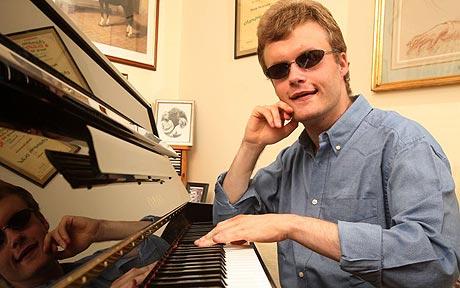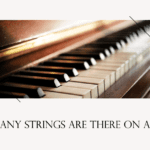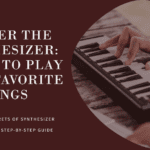Introduction
Ever heard of a blind piano player? Most know of Ray Charles – the legendary musician who crafted soul-infused blues and gospel. But, there are many other blind people who have comfort and joy in playing the piano. This article will share five inspiring blind pianists and how they succeeded against all odds.
Overview of the power of music
Music has incredible power. It can make you feel things no other thing can. But what if it’s the only sense you have to learn something?
We have seen many blind pianists do amazing things with music, even though they can’t see it. These five individuals have been renowned for their skills. They have shown us the power of music and also that people can do amazing things in the face of difficulty.
Some examples include:
- George Shearing
- Luther Vandross
- Jose Feliciano
They may not be able to see the sheet music or watch fingers move along keys, but they have trained their ears and fingers in ways most sighted people can’t.
The 5 Piano Players
Music is powerful! It can change lives. There are five amazing, blind piano players who do not let their disability stop them. They show that anything is achievable with some motivation and effort. Let us discover these incredible individuals!
Ray Charles
Ray Charles Robinson, born on September 23, 1930, was immediately diagnosed with glaucoma, leading to total blindness by the age of seven. At fourteen he began his lifelong journey in music. His debut album The Greatest Hits of Ray Charles in 1948 featured “Hit the Road Jack,” “What’d I Say?,” and “I Got a Woman.”

He earned twelve Grammy awards for albums such as Genius + Soul = Jazz (1961), Modern Sounds in Country and Western Music (1962) and The Genius Sings the Blues (1962). In 2004, he was posthumously awarded a Grammy Lifetime Achievement Award. He also contributed to many movie soundtracks, including The Blues Brothers in 1980.
Ray Charles has become an iconic figure in music and popular culture. His combination of gospel, R&B, country, and pop music has shaped his legacy. He is one of our five blind piano players, proving that anything is possible!
Stevie Wonder
Stevie Wonder is an iconic musician and singer from Detroit, Michigan. Blind since birth, he can play over 20 instruments, primarily keyboards, and drums. In 1972, he made music history with Music of My Mind, which was the first of many successful albums.

Wonder is renowned for his extraordinary piano-playing skills. These were recently showcased in 2018 at the “Stevie Wonder: Songs in the Key of Life” memorial concert. His impressive ear for music enables him to compose complex pieces effortlessly. His songs often focus on themes of love, peace, unity, and inclusion – ideals he values highly.
Humble and endearing, Wonder is one of the most talented musical minds of our time. He serves as a source of inspiration to those who strive to fulfill their dreams, regardless of any obstacles they may encounter.
Tom Sullivan
Tom Sullivan’s story is remarkable and inspiring. Born without vision, he was determined to learn piano – despite being told it was impossible. He dedicated himself and used his determination to read traditional sheet music, and notes in Braille, familiarize himself with rhythm and tempo and learn harmony.

Fellow piano players – take note: nothing is impossible if you set your mind to a goal!
Throughout his musical career, Tom has performed at many events such as benefits and festivals. He was even featured in The Orlando Sentinel newspaper at the Winter Park Arts Festival. Organizations such as Easter Seals have recognized his incredible achievement and named him one of their 1 million American disability heroes.
Tom Sullivan teaches us all an inspiring lesson – he found release through music instead of becoming discouraged by his visual impairment.
Nobuyuki Tsujii
Nobuyuki Tsujii, a Japanese pianist born without sight, has won multiple awards. One of them was the first prize at the 13th Van Cliburn International Piano Competition in 2009. He made history as the first grand prix recipient to receive two gold medals for his performance.

Tsujii has performed with well-known orchestras like The New York Philharmonic. He also played all of Beethoven’s five piano concertos in Japan in 2011, which took 10 hours and 30 minutes. Furthermore, he has worked with many renowned musicians, e.g. Maxim Vengerov, Johannes Moser, Leonard Slatkin, and Mischa Damev. He released CDs featuring his own composition “The Sea Knows“, published by Atarashi Records.
Derek Paravicini
Derek Paravicini is an English musician. He was born blind and autistic due to a medical emergency. His parents encouraged him to express himself through music. Derek started piano lessons at age three. By six, he was playing jazz piano with his incredible auditory memory and improvisational skills.

Derek’s musical talent astounds people worldwide. He has memorized over 7500 compositions and can recognize pieces after just one listen. He has worked with superstars like Time McGraw, and recently performed at The Royal Albert Hall with Jools Holland. His story is remarkable. It shows that creativity and human potential have no limits.
How They Overcame the Odds
The might of music is undeniable. Five blind piano players, who overcame the odds to succeed, prove it further. These musicians persevered and reached great success with their passion and music.
Let’s take a closer look at these inspiring five musicians. See how they overcame their blindness:
Adversity and determination
Adversity and determination are two powerful forces in life. This could not be truer when applied to the inspiring individuals documented in this article. All five of these musical prodigies had one major obstacle – blindness. But they did not let this handicap stop them from achieving their dreams.
When faced with complete visual impairment, many people struggle. But these five brave individuals pushed past the boundaries and thrived. In only a few months, they were able to play piano classics like Bach’s “Toccata-Fugue” by listening carefully.
These individuals’ love for life and music despite their misfortune is inspiring. They chose to focus on preserving their independence after losing their sight and kept practicing to figure out what works best for them.
Together with the strength of the human spirit and willpower, these blind key masters show us that anything is possible with resilience and optimism!
- You Also Might Like: Roland Digital Piano
Adapting to their new reality
Tragedy and odds seemed insurmountable, but these blind musicians didn’t give up. They adapted their playing styles, instead of allowing their vision loss to dictate their fate. The 5 extraordinary piano players featured in this article have unique approaches to altering how they play music.
Schimmel and Smith relied on tactile sensations to make a mental map of the keyboard. Lousada trained with intense methods and sharpened his ear for sound. He used his knowledge to reorient his technique for impaired sight. Vardapetjan experimented with touch. He used varying note sizes to get muscle memory through repeated practice.
Hsieh is now “The Queen of Two Keyboards“. She rapidly switches back and forth, between two identical pianos, in successive runs. This helps her maintain accuracy in fast-paced pieces. Cohen developed an internalized auditory map. He also does finger exercises to help him find notes when playing from memory – even when he hasn’t “seen” or felt those keys before.
This level of adaptation requires courage, discipline, dedication, and skill. So much so that it could be mistaken for a superpower. Schimmel, Smith, Lousada, Vardapetjan, Hsieh, and Cohen are doing something beyond extraordinary – no small feat considering their physical limitations!
- Read Detailed Review of Yamaha P-125
Reaching new heights
Five talented blind pianists have achieved great success in the music world, despite their visual impairments. From inspiring composers to modern jazz virtuosos, their stories show us dedication and hard work can make anything possible.
- Ray Charles was a renowned American soul singer and pianist of the 20th century. He taught himself the keyboard by listening to and experimenting with chords. His greatest hits include “What’d I Say?” and “Hit the Road Jack”.
- Oscar Peterson was an incredible jazz player, often compared to Art Tatum. He amazed audiences with his improvisations and his recordings remain popular to this day. Even after he was diagnosed with progressive blindness, he kept performing. His vision worsened but it didn’t stop him from creating music until his death in 2007.
- In 1945, Teresa Carreño became the first female Latin American pianist to perform at Carnegie Hall. She received standing ovations for her interpretations of Beethoven, Chopin, and Mendelssohn. Despite becoming totally blind, she went on to compose innovative works which are still performed today.
- Other blind pianists include Yefim Bronfman, who has performed with Leonard Bernstein; stride master Mark Pane, who plays jazz, blues, funk, soul, classical & gospel; and Mary Louise Woodson Bornstein, whose compositions must be heard!
Conclusion
Music can do amazing things! These five remarkable people have gone beyond what was thought to be impossible. They have proved that even the biggest obstacles can be overcome. Anything is achievable if you set your mind to it.
Summary of the power of music
Music is an incredibly powerful force that can help people reach new heights. It can inspire, connect, motivate, and heal. These five blind pianists demonstrate the power of music.
- Hercules Gomes lost his sight as a child. But he found his vision through music. He’s toured the world for more than 20 years.
- Ron Biagi is a professor. He used music therapy to overcome blindness. He’s achieved a lot academically. Degrees are too long to list!
- Roberto Olzer never saw. Yet he defied expectations by playing classical music in over 200 performances. Across Europe, America, and Australia.
- Yehuda Nachmias’ success was made possible by classical piano lessons. He’s recorded 6 CDs of original piano works. Including one called ‘Dreams of Blindness‘.
- Martin Kline adapted the piano for blind performers. With raised keybeds and clips in the braille alphabet. So he could feel which keys he was playing.
These pianists show us what we can achieve with faith and courage. Music gave them wings. Allowing them to soar above adversity. Showing us how beautiful life can be. When we open our wings and fly high!
Motivational message
Music can inspire, motivate and bring hope for a brighter future. The five blind piano players have a remarkable success story. Unimaginable as it may be, these players can play some of the greatest music pieces, despite not being able to see.
They have learned to feel and understand the techniques of playing any piece they choose. Though they may not grasp the appreciation of their art from true music fans, they still should be praised for their talents and determination. Music is very powerful. It invokes strong emotions, creates atmosphere, and, most importantly, has helped these five incredible piano players prove that anything can be achieved with focus and drive.
Frequently Asked Questions
Q: Who are the 5 blind piano players?
A: The five blind piano players who prove anything is possible are Stevie Wonder, Ray Charles, José Feliciano, Ludovico Einaudi, and George Shearing.
Q: What are some of the accomplishments of blind piano players?
A: The blind piano players have achieved a number of impressive accomplishments. Stevie Wonder has won 25 Grammy awards, Ray Charles has been inducted into the Rock and Roll Hall of Fame, José Feliciano has sold over 40 million records, Ludovico Einaudi is one of the best-selling contemporary classical musicians, and George Shearing has composed over 300 works.
Q: How do blind piano players play the piano?
A: Blind piano players rely on their sense of touch and their ability to memorize the notes, chords, and rhythms of the music they are playing. They also use the aid of Braille music notation and other tools to help them play the piano.





